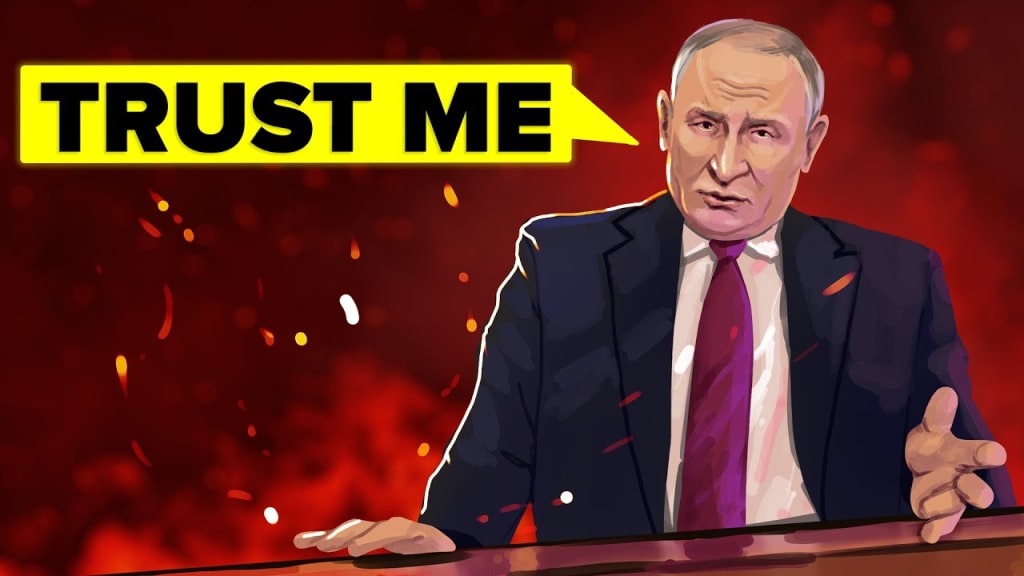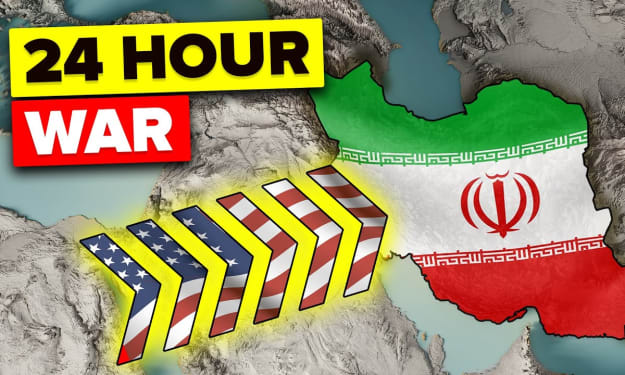What is Putin REALLY Trying to tell Russian Citizens Again about Ukraine War?
You are aware of Russia's catastrophic failures in the Ukraine war. You've probably heard about Russian soldiers hesitating to battle. You're well aware of Russia's atrocities and shady techniques. However, you seldom hear Putin's point of view or what he tells his family back home. Today's amazing new narrative uncovers what Putin has been telling Russia about the Ukraine war!

You are aware of Russia's catastrophic failures in the Ukraine war. You've probably heard about Russian soldiers hesitating to battle. You're well aware of Russia's atrocities and shady techniques. However, you seldom hear Putin's point of view or what he tells his family back home. Today's amazing new narrative uncovers what Putin has been telling Russia about the Ukraine war! 😎😉😇
You are aware of how badly Russia suffered during the conflict in Ukraine. You've heard tales of Russian soldiers who chose not to engage in combat. You are well aware of the atrocities committed by Russia and its despicable strategies. But you frequently don't hear Putin's perspective or what he is saying to his family at home. So, give thanks for everything because we're about to expose you to Vladimir Vladimirovich Putin's declarations and accusations. You probably already know that Russia used different terminology than the rest of the world when this all started in February 2022, when the conflict that began in 2014 escalated into a full-scale war. Don't call this a war, stressed Vasily Nebenzya, the Permanent Representative of Russia to the UN.
This is referred to as a "special military operation." On February 24, 2022, Putin made an appearance on television and assured his audience that this was a special operation and not a battle. If something looks like a duck, swims like a duck, and quacks like a duck, and then it probably is a duck. That was a saying that Putin and his associates likely hoped Russians had never heard of. Even though Putin just said he wasn't in the mood to answer any more tedious questions, we should first examine what he initially told the Russian people about the alleged special operation. This program will pay particular attention to narratives today. The recent military analyst's observation that the conflict in Ukraine is as much about narrative control as it is about armed conflict is accurate.
Putin wants control, and so do his adversaries. Putin's statements are weapons because maintaining control is crucial to winning. The narrative will go on to explain what we mean by this. When the conflict started, Putin spoke about the tragic events in the Donbass and claimed that his invasion was necessary for Russia's security. He attributed the start of the conflict to irresponsible Western politicians, whom he also accused of toppling Viktor Yanukovych, the duly elected pro-Russian leader of Ukraine. Concerning Putin's story, this was crucial. He has consistently asserted that the West, specifically the USA, is the main puppet master in this conflict and that it is being fought through proxies.
This is why he was relieved to see a leaked phone call between US Assistant Secretary of State Victoria Nuland and US Ambassador to Ukraine Geoffrey Pyatt on YouTube. She implies that she is choosing the person who will lead Ukraine in the passage, as if she were doing so herself. Although she clearly had favorites, that doesn't mean she actually, practically, chose him. "I don't think Klitsch should work for the government, for instance," she said. I don't think it's necessary, and I don't think it's a good idea. She was alluding to Vitaly Klitschko, a once-dominant heavyweight who is now a politician. She continued, "I believe Yats is the guy with the economic experience and the political experience." It's him. Klitsch and Tyahnybok on the outside are what he needs.
Arseniy Yatseniuk, who did become the PM, was the person she meant when she said "Yats." Although Nuland achieved her objectives, as we previously stated, this does not imply that she had the authority to install the individuals she desired in positions of authority. That witty exchange, during which she famously exclaimed, "BLEEP the EU," undoubtedly gave the impression that the US was in charge. After all, the US has been installing various leaders around the world for many years, sometimes overthrowing democratically elected officials in favor of tyrants. Nuland had laid a golden egg in Putin's lap and placed a feather in his hat for the Russian leader.
With support from what he called a history of meddling, he used this as an illustration of US meddling in foreign affairs. She felt embarrassed and later said she wouldn't comment on "private diplomatic conversations." People still argue about how much influence the US had and still has in Ukraine, despite the assertions of experts like political scientist John Mearsheimer and economist Jeffrey Sachs that this is unquestionably a proxy war. We will not comment further on this issue. It's a very convoluted tale, but suffice it to say that Putin answered the phone—a call that Russia might have exposed. Madame Nuland doesn't just swear; a Russian newspaper gloated.
Additionally, she provides thorough instructions on how the three puppets from the Kiev Maidan should behave. The White House simply stated that the phone call represented a new low in Russian diplomatic technique without disputing its veracity. If the Russians were involved, it was definitely cunning. However, it must be acknowledged that this call gave Putin a lot of ammunition. As we previously stated, we are unsure of the extent of US influence over Ukrainian politics. He repeatedly explained to Russian citizens how the US wanted to destroy their nation. The majority of the population had faith in him. Imagine if the shoe was on the other foot and a prominent Russian politician had been heard discussing attempting to oust the current American president.
After that, he was elected. At the very least, many people would have been leery, and the US press would have had a field day. It's difficult to hold the Russian people responsible for their lack of suspicion of US intentions. Putin frequently discussed NATO expansion, saying he had been patiently attempting to reach an understanding with the organization for a long time. He bemoaned the cynical lies and deceit NATO was spewing, as well as the pressure and blackmail he claimed to be experiencing. He said the same thing back then as he does now. In this regard, nothing has changed. He has spoken out against the US and its allies' conceit in meddling in the domestic and foreign policies of other nations.
According to him, the US views itself as having absolute superiority over all other countries, and after the fall of the Soviet Union, Russia was taken advantage of at a time when it was most vulnerable. In particular, when it comes to the Middle East, where, according to Putin, the US conducted an illegal use of military power, leading to what he called international terrorism and a humanitarian catastrophe in places like Libya, he claimed that the US's conceit knows no bounds and that international law means absolutely nothing to this country and its closest allies. You already know that he needs people to buy into his current story, and this supports it. Don't shoot the messenger, please.
We were merely relaying what he said to you. This does not necessarily imply that he is correct or incorrect, just repeating what he said. He was using it to support the invasion by pointing out that NATO's eastward expansion was yet another instance of this exceptionalism. NATO, he claimed, had betrayed and duped Russia. In order for this to make a little more sense, we should point out that NATO is merely a cover for US foreign policy in Putin's eyes. He even went so far as to refer to the US and its allies as a group of con artists, which, you must admit, would be quite funny if the situation weren't the complete opposite of funny. He referred to the US as an empire of lies; despite the fact that he still thought it was a fantastic nation.
However, he warned that nations would suffer if they refused to comply with US demands; he calls this the "squeeze." He claimed that although Russia was ready to discuss the issue with the US and its allies, it was now under pressure. He also claimed that the US wanted to completely destroy us. Ironically, he spoke about how the US wants to spread its values, which he described as degenerate and opposed to human nature. Anyone who is familiar with the history of the Soviet Union would find this to be some pretty blatant hypocrisy. But this is what the Russian people heard, and many of them may have agreed with him, as Putin's rise in the popularity polls further demonstrated.
By inventing a good-versus-evil dichotomy, he was doing what any leader would do. Exaggerations and personal theories are added to truthy passages in a malicious scenario. He was perfecting his story. His main argument is that Russia is innocent of all wrongdoing and is the target of bullying from the global superpower. In this regard, he issued a stern warning, saying that any potential aggressor would meet defeat and dire repercussions. Atomic weapons were the subject of his comment. Then he clarified his remark by saying that they would only be used if used against Russia, and he added that NATO would never be able to get away with moving east.
"Absolutely unacceptable," he declared never under his watch. "It is a life-or-death situation for our nation," he declared. He continued, "This is a fact, not an overstatement." He then informed them that Russia's special military operation was for the people of the Donbas, who had placed their faith in Russia helping them after many had died at the hands of Ukrainian forces in what he termed “genocide”. So, can you imagine what many Russians, huddled as a family in front of their TVs, were thinking at that point? He used the term "Neo-Nazis," claiming that they had a significant presence in Ukraine. He even told his audience that his right-wing adversaries in Ukraine had even considered acquiring nuclear weapons, adding, "We will not let them do that."
Of course, you know differently. You've heard a distinct tale. Despite the fact that you are aware that the country has had issues with the far-right wing on occasion, you do not believe that Ukraine is heavily infected with Neo-Nazis. Putin claims that you don't believe in Russia's innocence, but the Russian people have heard this claim repeatedly. Transparency issues weren't helped when, according to Reporters Without Borders, Russia adopted a draconian press law in March. According to Putin, any journalist found to have published false or deceptive information about the situation in Ukraine could face a 15-year prison sentence.
With that in mind, how can citizens of that nation read news reports that contradict Putin and his nifty justification of events? After the passage of that law, the BBC, Bloomberg News, CNN, ABC, and CBS News ceased reporting from Russia and stopped news gathering there. For the reporters, it was too risky. Putin wanted to make his narrative unchangeable. As one critic said, we are looking on helplessly as Russia's independent media are being silenced to death. Vladimir Putin has delivered the final blow and completed the destruction of Russia's independent media. The Russian government then went about blocking and banning all kinds of websites in Russia where people might get to read a more expansive tale of the tape with regards to Ukraine.
Russia even clamped down on a woman on Instagram who disagreed with Putin's narrative. She said she might now be looking at six years in prison. She wasn't being paranoid. A guy named Ilya Yashin was recently sentenced to 8 years in prison for criticizing Putin on a YouTube live stream. This guy spoke the truth when he said, "After being sentenced, with that hysterical sentence, the authorities want to scare us all, but it effectively shows their weakness."






Comments
There are no comments for this story
Be the first to respond and start the conversation.